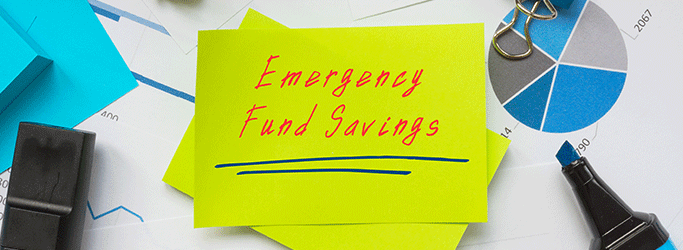Managing Money | Money Basics
With an emergency fund, you can bounce back from disaster

If there’s ever a time that makes an emergency fund more important than ever, it’s a global pandemic. The COVID-19 pandemic has robbed many of their life savings, making it clear that even those seemingly in the prime of their youth can lose everything in a snap.
No matter how secure everything may seem today, you really can’t tell what will happen tomorrow. Whether it's getting sick with COVID-19, losing your job, crashing your car, breaking a bone, or a tree falling on your house during a typhoon–all it takes is one unexpected event to drain your bank account.
Having an emergency fund can protect you from financial ruin. By setting aside money, no matter how small, you can bounce back and recover even after a disaster.
What is an emergency fund?
An emergency fund is a cash reserve specifically set aside for unexpected expenses you may need to make. These may include sudden hospital visits, car accidents, home repairs, loss of income, or even the ongoing global pandemic.
Emergency savings can be used for either small or large payments that you do not routinely have to pay for.
Why do you need an emergency fund?
Emergency funds help save you from financial shock. Let’s say you’re suddenly retrenched at work or someone in your family has a medical emergency. If you do not have an emergency fund, you are forced to tap into the savings you use to pay for your bills, which may wipe it clean. Having an emergency fund, on the other hand, gives you a buffer and something to use when a rainy day comes so your savings are spared.
As many people learned during the pandemic, a financial shock can derail your goals. It can even send you into debt.
Those who experienced difficulty recovering from a financial shock have less savings to protect themselves from future emergencies. They may resort to using their credit cards, which have high monthly interest rates that can cause them to incur more debt.
How much should your emergency fund be?
There isn’t a set amount to how much your emergency fund should be. Most experts recommend putting aside three to six months’ worth of your salary. Think about what kind of unexpected situations you might find yourself in and how much they would cost you. This helps you figure out how much you need to set aside.
For those living paycheck to paycheck or struggling to make ends meet, putting together an emergency fund may seem daunting, but a little goes a long way.
How do you start building an emergency fund?
There are numerous ways to build your emergency fund, so find one that works for you and your current financial situation. You can even use all of the following strategies or mix-and-match them to find the perfect one for you.
Strategy 1: Create a savings habit
Start by having a goal for your savings so you stay motivated. Then make it a habit to put a set amount of money away each month or quarter. This is the fastest way to grow your emergency fund.
You can use an app to send you monthly reminders to fund your emergency savings, make a fun spread in your planner to track all your contributions and progress, or even have it auto debited by your bank.
Strategy 2: Manage your cash flow
You may think that you are making just enough to get by, but if you actively track your cash flow, you may spot areas where you can move things around so you can save a few pesos each month.
For example, if you see that you tend to spend a lot on takeout coffee, you can sacrifice this and put the money towards your emergency fund instead.
Strategy 3: Make the most of windfalls
Windfalls are unexpected sums of money you get, such as birthday gifts, Christmas gifts, raffle prizes, lottery prizes, and so on. While it may seem tempting to treat yourself and splurge on online shopping, you can either save it all or put away even just a portion of it for your emergency fund.
How long does it take to build your emergency fund?
This depends on a number of factors.
- How much are you targeting to save for your emergency fund?
- How much are you putting towards your emergency fund each time?
- How often are you putting money in your emergency fund?
There isn’t a set deadline for how long it should take to build an emergency fund, but you should note that the longer you go without one, the longer you are financially unprotected.
Where should you store your emergency fund?
It depends on your situation. You want to make sure your emergency fund is safe, accessible, and is in a place where you can’t be tempted to use it.
Some places you can keep your emergency fund include the following:
- Bank. This is the easiest and perhaps the smartest option. Open a dedicated account just for your emergency fund so you don’t get tempted to touch the money in it. With a bank account, you can even auto-debit money directly to your emergency fund so you stay committed to building it.
- Cash. Another option is to keep your emergency fund literally on-hand. Keep in mind, however, that cash can be stolen, lost, or destroyed in emergencies, like a flood or fire.
A final word
Rainy days can happen any time, and can change your life in an instant. Of course, no one wants to be helpless during an emergency, whatever kind of unexpected circumstance that may be. Hence, an emergency fund can soften the blow and make sure you bounce back.
Let Metrobank assist you in building your emergency fund. Talk to us today to discuss your options.
More Smart Reads